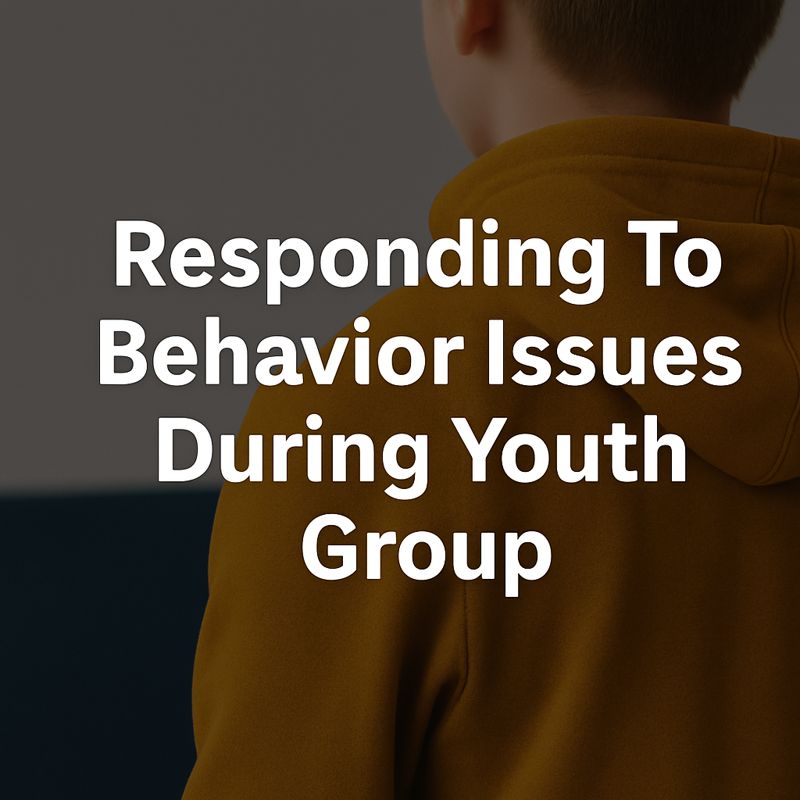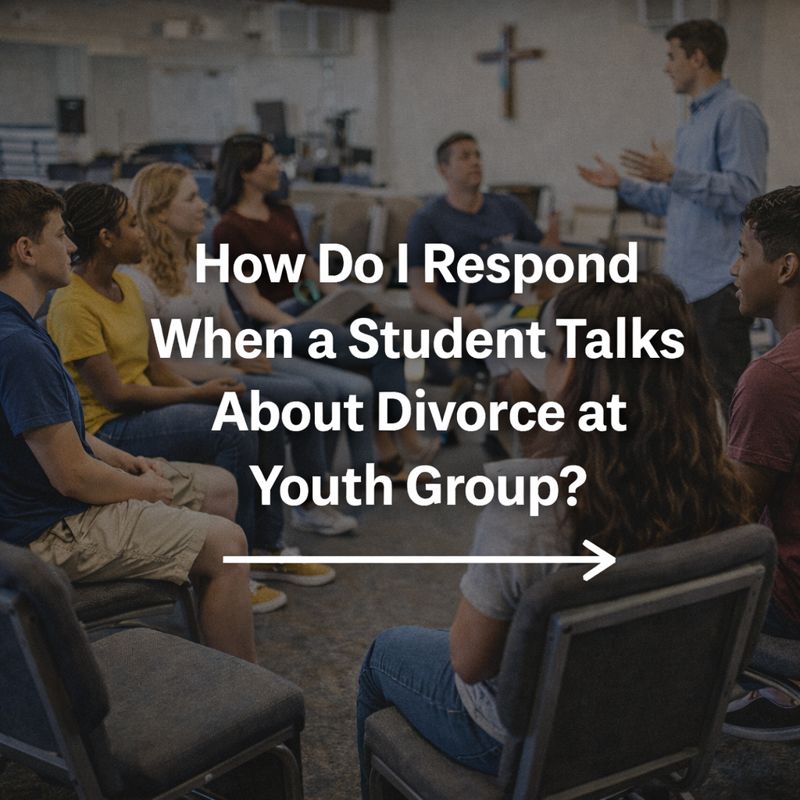
Responding To Behavior Issues During Youth Group
A tired, defeated youth pastor emailed me recently asking for advice about behavior issues during youth group. She had already

Youth pastors know the weight of choosing the right curriculum. Pick something biblically weak and your students miss out on depth. Choose something too heady and they check out entirely. Find something too generic and they never connect. With so many options and so much at stake, it can feel like walking a tightrope. I think we’ve all felt that pressure—choosing a curriculum feels like choosing the kind of faith your students will end up with. We want to be sure that what we’re teaching is solid, engaging and relevant.
A great youth ministry curriculum should do more than provide a stack of sermons. It should shape the faith of your students through intentional teaching, biblical depth and real-life relevance. When you’re figuring out what to look for, it helps to have a few guiding principles. Here are five factors that can make the difference between a curriculum that simply fills time and one that transforms lives.
Some curriculum materials focus mainly on morality—teaching students to be “better people.” Others put the spotlight on behavior—helping students make “good choices.” Those approaches aren’t all bad, but they miss the point. The best curriculums focus on Jesus. They invite students to see everything through the lens of the gospel and remind them that spiritual growth doesn’t come from trying harder. It comes from being transformed by grace and truth.
Ask yourself if the curriculum connects back to Jesus instead of landing on “try harder” messages. Students don’t need moralistic therapeutic deism; they need to see how the gospel shapes every part of life. When we talk about forgiveness, are we pointing them to the cross or just telling them to forgive because it’s nice? Does the curriculum emphasize both grace and transformation? I’ve seen kids who thought Christianity was just about following rules come alive when they finally understood that Jesus loves them even when they fail.
If a curriculum doesn’t center on Jesus, it won’t produce lasting change. Students may behave better for a while, but their hearts won’t be transformed. A gospel-centered foundation ensures they learn to see the Bible not just as a set of stories or commands but as a revelation of Christ. When they see Jesus at the center, they find hope and motivation to grow. For me, that’s what makes youth ministry worth it: watching students discover the beauty of Jesus and letting that shape everything they do.
Students need strong theology, but they also need a reason to care. A great curriculum should be deeply biblical without feeling like a seminary class. We’ve all seen the glaze that comes over students’ eyes when a lesson starts sounding like a lecture. Depth doesn’t have to be dull. It can be as simple as walking through a passage and asking, “How does this change the way you think about God?”
Instead of spoon-feeding answers, let students wrestle with real questions. In our group, I’ve found that when we open the floor for questions, kids ask things we never would have thought of. A curriculum should move beyond surface-level faith and challenge students to think critically. It should walk through Scripture faithfully rather than pulling random verses out of context. Does it equip students to think biblically instead of just telling them what to believe? The more they discover for themselves, the more their faith becomes their own.
Good teaching always includes application. Shallow faith won’t stand when real life gets messy. When we studied the book of James, I saw students grappling with the idea that faith without works is dead. They asked, “What does that mean for me at school?” That’s engagement. Depth invites questions and leads to discovery. As we point students back to Scripture and invite them to dig in, they find that the Bible is not just a dusty book but a living word that speaks to them now.
A great curriculum doesn’t just teach what the Bible says; it helps students see how it changes their everyday lives. Faith can’t stay in the youth room. It has to go with them into school, friendships, struggles and decisions. If lessons stay theoretical, students tune out. But when they see how a verse speaks to their fear about the future or their fight with a friend, the Bible comes alive.
Does the curriculum connect biblical truth to real student struggles? It should talk about identity, stress, relationships and doubt in ways that resonate. Will it equip students to live out their faith Monday through Saturday, not just on Sundays? A good lesson should end with a challenge to take action. I once led a lesson on forgiveness that ended with students writing letters to someone they needed to forgive. It was awkward, but powerful. A sermon without application is just another speech.
Great curriculum helps students live what they learn. It invites them to pray for a friend, serve someone in need or memorize a verse to use when tempted. When students see a connection between faith and real life, they start asking how God can be part of every moment. That’s the kind of faith that sticks.
Not every youth group is the same. What works in a megachurch with hundreds of students may feel off in a small church with ten. A great curriculum is flexible enough to adapt to different settings, group sizes and teaching styles. You shouldn’t have to choose between staying on track and meeting the needs of your students. I’ve worked in small town churches and big city ministries, and the needs are always different.
Does your curriculum offer discussion-based options for small groups? Can you break the lesson into questions that fit a group of three or adapt it for 50 kids? Is it structured enough to guide but flexible enough to adjust? Or is it so rigid that you easily fall behind? The best materials let you modify them for large or small groups without much effort. If you’re leading a campfire conversation, you don’t need a 30-minute message; you need questions that spark real talk.
Your students aren’t one-size-fits-all. Your curriculum shouldn’t be either. Flexibility makes it possible to create moments where every kid feels seen and engaged. It also respects the reality that youth pastors often juggle multiple roles. A curriculum that adapts to your context means you spend less time forcing a square peg into a round hole and more time investing in relationships.
Youth ministry isn’t a one-person show. Your curriculum should empower your team, not just feed you content. A great curriculum includes leader guides that make it easy for volunteers to step in and lead. It includes discussion questions that help small groups dive deeper. Interactive activities and creative elements are a bonus, and resources for parents help keep conversations going at home.
Ask yourself if the materials include training tools for volunteers who may not feel confident. A new leader shouldn’t have to guess how to guide a discussion. Does the curriculum provide background info, key questions and ideas for application? Does it include parent resources to extend discipleship beyond youth group? Or is it only focused on students? A curriculum that equips your team makes it easier to build a ministry where everyone is discipling someone.
When a curriculum empowers your leaders, your whole ministry gets stronger. A leader who feels prepared will lead with confidence. Parents who know what their kids are learning can ask better questions at home. A team that is well equipped can reach more students and go deeper with them. That’s how a good curriculum becomes a catalyst for growth.
A curriculum is a tool, not the goal—but choosing the right one makes all the difference. For more on that, check out Choosing The Best Youth Ministry Curriculum For Your Church.
1) A gospel-centered foundation ensures students are being transformed by Jesus, not just taught moral lessons.
2) Biblical depth keeps students engaged while grounding them in truth.
3) Practical application helps students see why faith matters in their daily lives.
4) Flexibility ensures it works for your unique ministry setting.
5) Leader resources strengthen your team and make discipleship more effective.
If your curriculum checks these five boxes, you’re setting your students up for real, lasting spiritual growth.
Are you leading in a small church? You should check out Small G – A curriculum subscription plan designed specifically for churches with a small youth group, unique pace, and limited budget.
Related Posts:
How to Structure a Yearlong Teaching Plan for Your Youth Group
Check out Base G – A gospel-centered, student-engaging curriculum designed to help youth pastors teach with depth, relevance, and impact.

A tired, defeated youth pastor emailed me recently asking for advice about behavior issues during youth group. She had already

It’s a fact: we could not do youth ministry or have a thriving group without our volunteers. Volunteer leaders allow

If you’ve been in youth ministry longer than a few years, you’ve had a student bring up divorce at youth